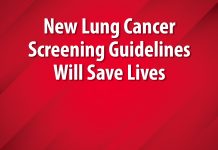• The global, randomized phase III ALEX study was announced to have met its primary endpoint, demonstrating that alectinib (Alecensa), as an initial (first-line) treatment, significantly reduced the risk of disease worsening or death (progression-free survival) compared to crizotinib in people with anaplastic lymphoma kinase (ALK)-positive advanced non-small cell lung cancer (NSCLC). This is the second phase III trial to show the efficacy of alectinib as an initial treatment in this type of lung cancer. The safety profile of alectinib was consistent with that observed in previous studies, with no new or unexpected adverse events. (4/10/17)
• Afatinib (Giotrif) was granted marketing authorization by the European Commission for the treatment of patients with advanced squamous cell carcinoma (SqCC) of the lung whose disease has progressed on or after treatment with platinum-based chemotherapy. Afatinib is already approved for the treatment of patients with EGFR mutation-positive NSCLC. (04/07/17)
• Dabrafenib (Tafinlar) in combination with trametinib (Mekinist) was approved by the European Commission for the treatment of patients with BRAF V600-positive advanced or metastatic NSCLC. The approval marks the first targeted treatment approved for the patient population in the 28 member states of the European Union (EU), plus Iceland and Norway. (04/03/17)
• Osimertinib (Tagrisso) was granted full approval by the FDA for the treatment of patients with metastatic epidermal growth factor receptor (EGFR) T790M mutation-positive NSCLC whose disease has progressed on or after an EGFR tyrosine kinase inhibitor (TKI) therapy. Osimertinib is the first and only approved medicine in the US indicated for NSCLC patients who have tested positive for the EGFR T790M mutation. (03/31/17)
• Osimertinib was also approved by the China Food and Drug Administration (CFDA) as a second-line treatment for EGFR T790M mutation-positive metastatic NSCLC. Lung cancer is the leading cause of cancer-related deaths in China and approximately 30% to 40% of Asian patients with NSCLC have the EGFR mutation at diagnosis. (03/27/17)
• Ceritinib (Zykadia) was granted a Priority Review from the FDA for expanded use as a first-line treatment for patients with metastatic NSCLC whose tumors are anaplastic lymphoma kinase (ALK)- positive (ALK+). The FDA also granted Breakthrough Therapy designation to ceritinib for the first-line treatment of patients with ALK+ metastatic NSCLC with metastases to the brain. (02/23/17)
• Alectinib (Alecensa) was granted conditional marketing authorization by the European Commission as monotherapy for the treatment of adult patients with anaplastic lymphoma kinase (ALK)- positive advanced











